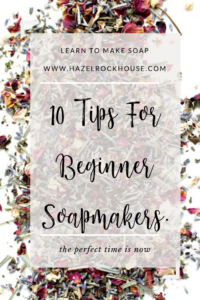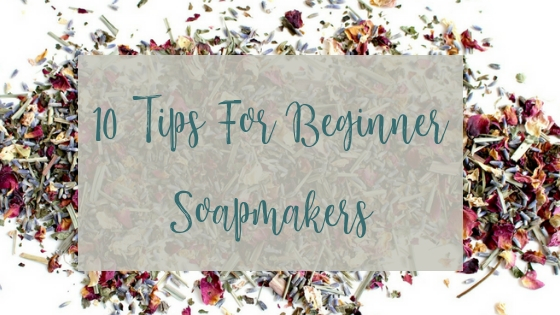Beginning something new is difficult. You don’t know if you are missing something or not. It is difficult even to ask the right questions and search for the right information. So I thought I’d give you a few tips to get you started.
1. Find information yourself before you start.
Making soap is rewarding and fun but it isn’t just as simple as showing up and starting.
Lye is a dangerous material to work with if you don’t know what you are doing so you should read up on the safety precautions you will need to take. You can read my post on lye safety here.
Soap is made by a chemical reaction between lye and oils so you need to know what exactly is happening here before you start. Making yourself aware of the reaction means that you will be able to be clear on the procedure and why we are doing it.
You can get a lot of information about soapmaking on the internet, in books, videos, blogs and articles. Be aware that all information on the internet is not reliable! I would advise you to check out Soap Queen, Royalty soap and Soaping 101 on Youtube for information and inspiration. There are loads of blogs with information (including our own blog). For books, I would recommend the two Soap Queen books, Pure Soap and Soap Crafting. Facebook groups are a very good source of information for free and if you have a specific question, many people will give their time to help you along. The Great Beginner Soap Making group is a good one to start with.
2. Take a class.
Whether online or in person, taking a class can lead you through the process of making soap with the guidance of an experienced teacher. It can be difficult to do all the research needed to begin soapmaking, especially because at the start you don’t really know what information you are looking for. It is always helpful to have an experienced person on hand to answer questions and provide a step by step process through your first batch. Classes are helpful when you come to learn a new technique or use a new process as well.
3. Start with a simple recipe such as our Bastile recipe.
The Bastile recipe is very simple, with only 2 oils and so is perfect for beginners. Ideally, you should make a batch with no colour and fragrance to start with. Just to get the hang of the process. Then you don’t need to worry about adding and mixing colour or any effects your fragrance might have on the batch. You can always add these things later as you go along and try out more elaborate techniques as you become more confident. It’s great to keep it simple from a troubleshooting point of view. If your first batch goes wrong, then you already know that it wasn’t the colour or fragrance if you haven’t added any. Then you can narrow down the possibilities until you find the reason. You can then fix it before you get more complicated.
4. Don’t buy a lot of expensive equipment straight away. Buy a couple of important things instead.
Resist the temptation to go out and buy fancy moulds, expensive butters and all manner of exciting equipment. You don’t need them at the start even though you may have fun buying them. Two things are very important to buy. A digital scale that measures in grams is important because you need to measure the ingredients accurately. Soapmaking is a chemical reaction involving precise amounts of ingredients. If one of these ingredients isn’t measured accurately, it can make the reaction unsafe. The other is a hand blender. It is possible to make soap by hand stirring but believe me, a hand blender will make it so much easier. They are inexpensive and available in all manner of shops and online stores.
5. Prepare in advance.
Weigh out all your ingredients in advance. This is really important because once the reaction starts, the clock is ticking! If you blend your oils and lye but then don’t have your fragrance and colour prepared, your soap batter may have thickened up too much. Having everything prepared at the start means that it is ready and to hand when you need it. If you are using a wooden or plastic mould, make sure you also line this in advance.
6. Wear your safety equipment.
Safety goggles and gloves are a must. It is really not a good idea to go without either of these, whether experienced or not. Make sure the gloves are well fitting and not too big, so you can easily work with the ingredients and equipment. Gloves that are too long in the fingers just get in the way. Goggles should be sturdy and you should be able to see out of them. Seems obvious, doesn’t it? But when your goggles are steaming up and your gloves are too big, things will not go to plan!
7. Use a slow-moving fragrance.
I’ve said before that the best recipe for your first soap is an unfragranced, uncoloured one. If you absolutely HAVE to have fragrance, use one that is slow moving. By this, I mean that it doesn’t speed up the rate of the soap reaction. Some fragrances make the soap batter get very thick, very quickly. You don’t want this when you are just learning as you will need time to work with the soap. You’ll be busy trying to identify trace and get your soap into the mould so don’t complicate things. Most spicy fragrances and spicy essential oils speed up the reaction but essential oils such as lavender are slower. I find the FO Love Potion is great to work with for beginners but it all depends where you are and what supplier you are ordering from. Check the manufacturer’s instructions or suppliers website for more details about your particular fragrance.
8. Don’t do a water discount
Soapmakers sometimes use less water than is recommended in the recipe. It can aid curing, help with glycerin rivers and enable the soap to be cut sooner. It also speeds up the rate of reaction so the soap gets thicker faster. This won’t give you time to work with the soap and is best left until you become more experienced.
9. Leave the dishes until the next day
After you have finished making the soap, you will need to clear up. I find the best idea is to leave the soap dishes until the next day. If you wash them straight away, you will find they are still caustic from the lye used to make the soap. It will take a lot of detergent to cut through this and you run the risk of burning yourself on the fresh soap. Instead, you can put all of your soap dishes in a large plastic bag and leave them overnight, somewhere safe and away from nosey kids or pets. By morning, the soap batter will no longer be as caustic as most of the saponification reaction will be finished. It’s much safer to wash them then as you won’t get burned. You won’t need any detergent as your dishes will now be covered with bubbly soap!
10. Take notes.
This is really important. For each batch you make, write down your observations in a small notebook. If you used a new fragrance, you can report its behaviour. If you soaped at a different temperature, you can record the differences observed. If you change anything, make a note of any differences. You will then be able to look back at all this information you have gathered if you come across a problem in the future. Believe me, you won’t remember it unless you write it down. It doesn’t have to be a long essay, just a little note to remind you.
Just a final little note about expectations. Your first batch might not work. You might make 5 great batches and then mess the next 3 up. You might take to it like a natural or you might take a while to get going. The important thing is that with each experience, you are learning. If you look at these troubles as a failure then you will be more inclined to give up but if you look for the lesson to learn, you have a starting point for the next batch.
In these days of social media, it can be very tempting to look at someone’s soapy creation with awe and wonder and wish yours was just as good. Remember that they likely started where you are now and have spent years perfecting their craft. So it is very unfair to compare yourself to them. You should only be comparing your latest batch to your previous batches. So long as you are improving, you are winning. I’ve shared my first soap experience here in case you need a little inspiration. Best of Luck!


